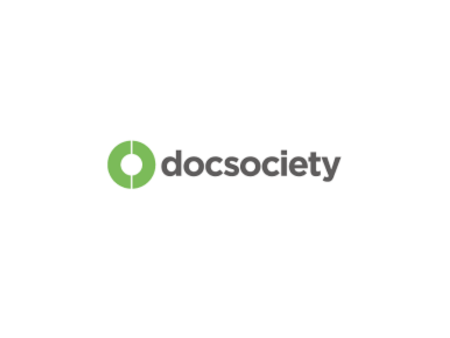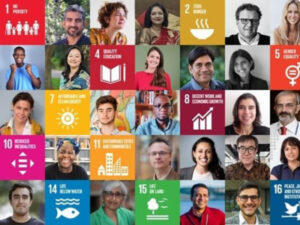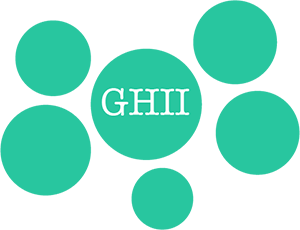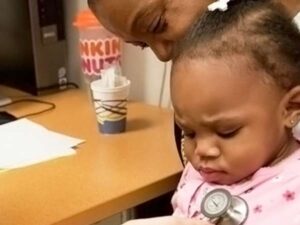Doc Society, a non profit foundation with teams based in Europe, East Africa, the Americas and Australia, is dedicated to supporting independent storytelling globally. In addition to providing grants to artists and journalists, and supporting the creative process, Doc Society helps them develop impact strategies that connect their stories with communities and allies across civil society. They champion the right of artists to self-expression, the right of citizens to access public interest media – and the strengthening of the global media ecosystem that is needed to make it possible.
Megha Agrawal Sood of Doc Society spoke with Alec Saelens on May 2, 2024. Click here to read the full conversation with insights highlighted.
Alec Saelens: Can you please introduce yourself and describe the problem you’re addressing with Doc Society and specifically with your climate project? What issue are you responding to?
Megha Agrawal Sood: Doc Society is an organization that’s been around for almost 20 years supporting filmmakers across the globe. While we’ve always supported a range of social impact issues, about five years ago, we started getting curious about how we can help make climate a priority in culture. How can we support a new wave of transformative storytelling that could help us lead to a more climate-just and biodiverse future? That was the impetus for why we established the Climate Story Unit.
Alec Saelens: Can you tell me more about how that project came about internally? How did the idea develop, and what’s the journey that you went through as an organization before you brought this to life?
Megha Agrawal Sood: We at Doc Society have supported a couple of different climate-themed documentaries over the years. What we started to realize, especially as awareness of the climate emergency increased, was that significant populations across the globe, especially those representing global majority communities, were not actually engaging in the climate conversation. We felt that it was because the climate-related content we saw in mainstream media wasn’t representing the complex realities of so many people across the globe. The stories that we’d see in the mainstream were very Global North-focused, with older white men talking about climate and biodiversity. They were very technocratic and doomsday-oriented. We were curious to know: Are there creatives representing those on the front lines of the climate crisis? And are they interested in telling different types of climate narratives than those that we’re seeing in the mainstream?
We decided to host a Climate Story Lab in New York in 2019 where we invited storytellers of all different mediums. In addition to documentaries, we included podcasts, stand-up comedians, and everything in between. We explored different questions. Can we have a conversation around the different types of narratives that we need to be telling now? How can we start working better together to make sure that these stories get out there? What are some old stereotypes we need to get rid of? It was a phenomenal and illuminating experience to recognize that yes, there are creatives out there who are excited about telling new types of stories, and yes, these stories engage different types of communities.
From there, we quickly started to realize that if we really want to support this work, we have to take a systems-level intervention towards it. We have to look at the whole ecosystem. That was the foundation for our four main program areas of the Climate Story Unit.
Building off of the momentum of that first Climate Story Lab in New York, we realized that there’s power in continuing this concept of hosting convenings to help build regional ecosystems of not just storytellers but also journalists, social scientists, movement leaders, distributors, funders, and everyone who’s working together and interested in climate storytelling. We decided that these labs should be led by local cultural institutions that already have those networks established. In the last four years, there have been 18 Climate Story Labs led by local cultural organizations, in regions ranging from Amazonia to Lebanon to Kenya to India and many other places. It’s been amazing to see this global network of regional storytelling and these climate storytelling ecosystems emerge. It continues to grow.
We’ve realized that there’s so much interest in these stories that we have to make sure these stories actually get made, so we launched the Climate Story Fund. The Climate Story Fund offers up to $150,000 per grantee to support production and impact-related activities for new climate narratives. This year, our focus is around visions of climate-just futures. We have re-granted $3.5 million through the Climate Story Fund over the last three years, to date. I believe we’re probably the largest fund that’s dedicated to climate storytelling and that supports all mediums, too. It’s been phenomenal to see what’s worked and where some of the lessons have been. What’s also been exciting is that every year, the amount of interest we see in the Climate Story Fund grows exponentially. This year we had 650 applications from 101 countries in four different languages. We’ve started to see a strong correlation between where Climate Story Labs have taken place and where we’re seeing applications for the stories come in from. It’s really getting this global breadth.
Our third program area is what we lovingly call The Kitchen, or the Climate Story Kitchen. That’s where we’re starting to experiment with new models of storytelling. A big focus for us has been around distribution because we very much believe that, whether it’s through a streaming platform or through WhatsApp networks, it is crucial that these amazing stories, alongside amazing impact strategies, actually reach their intended audiences by any means possible. One of the big partnerships we had last year was with the Australian Broadcast Corporation, and it’s really significant because many public broadcasters have been hesitant to support climate storytelling either because of the belief that there are not audiences out there for it, or because of political pressures.
It was really significant for the Australian Broadcast Corporation to say [that they] want to prioritize climate storytelling and commission and support the production of climate-themed shorts representing communities all across the country. And [also that they’re] going to distribute them, broadcast them through a platform, get them in festivals, and help them with impact strategies. Those are the types of things that we’re playing around with in The Kitchen.
Lastly is all of our ecosystem-influencing work. In order for this work to continue to thrive, especially as we’re thinking about how we can influence culture, we need to ask who are the external stakeholders that need to be a part of it. How do we bring in more impact producers who are excited about being the bridge between the power of storytelling and the movement? How can we bring in more philanthropy, like climate funders who may not have invested in culture yet? How can we bring them in and help them realize the power of culture as a solution to the climate emergency?
That’s our systemic approach to thinking about it. Ultimately, we see ourselves at Doc Society as an innovation organization. How can we create new models that help inspire and build confidence amongst those in the field, in media, in climate, and in philanthropy? This is possible, and it’s working. What’s needed now are more resources going towards other cultural organizations that are doing similar things.
Alec Saelens: What do you think is distinctive about what Doc Society is doing? Could you describe what makes your work different from the work of similar organizations?
Megha Agrawal Sood: Because we’ve been in the field for so long, Doc Society is able to take an innovative prototype approach. When we start to sense things emerging, we quickly start thinking about questions like: What is a new model, or a new way of working to address this challenge? Luckily, because our organization is so established and has really strong global networks, we’re very quickly able to tap into this amazing network of cultural organizations, and we have very close, trusting relationships with [other organizations] that can easily adapt those models for their own context. The reason why we’re able to be nimble and act in that way and then help share it with others is, quite frankly, because we are a Global North-based organization with access to Global North money.
When I think about scale, especially for the Climate Story Unit, it’s not about having more grantees or more programs, it’s about raising significant funds so that these cultural organizations who have also been working in their geography for decades, who have now made climate storytelling a priority within their own organization, can have their own multimillion-dollar fund to support climate storytelling in whichever way they see as best for their geography. That’s what I would say is the major difference; I think we have access to resources a bit more right now.
Alec Saelens: Do you have a case study or a particular example of the work you’ve done that is close to your heart, or that you think is emblematic of the work and success that you’ve had?
Megha Agrawal Sood: I think a great example of the work we’re doing through the Climate Story Fund is the work of one of our first grantees, the feature documentary The Territory.
The Territory is a phenomenal story about the community in the Amazon and their fight for their land. One of the many reasons why we were initially interested in supporting the story is because it leans into the complexity of the situation. It’s not a clear good versus evil. It shows all the perspectives of three different communities that are, essentially, stakeholders in the issue, and it gives insight into why people are behaving the way they’re behaving. The film premiered at Sundance, won an award there, and was picked up by National Geographic, which is a huge accomplishment because to get a streaming deal in the industry is very hard.
What was also phenomenal is that the team was very intentional about impact from the beginning, which is one of our requirements. Our grant allowed them to have an impact producer already onboard by the time of their premiere at Sundance. So when National Geographic picked them up, they were quickly enabled with a significant set of resources to start doing impact activities. They had this amazing whirlwind film tour, and they had always wanted to do work in Brazil, but that was a big election year in Brazil, so they weren’t able to do much there until after the elections were over. So they started to look at other interesting opportunities where the power of this film could help lead to some concrete climate actions.
When they were in the EU, there was a pretty landmark deforestation bill in discussion, which many advocacy organizations had been working towards building support for. The film team partnered with those organizations to host a private screening of the film to 150 MPs right before the vote. And on the day of the vote, many of the MEPs voted in favor of the bill, and it passed. Many of them cited the film. They literally said the film helped solidify their vote for it, which was really significant.
I think that not only illuminates the power of a really great story, and what can happen when you’re doing it in partnership with a movement, but also how we make sure that these incredible stories and their teams have the resources to be able to do this work and be opportunistic when moments like this happen, and be able to get the film out to whoever needs it. That example is just one small bit of a larger impact campaign they’ve been running for a couple of years now.
Alec Saelens: Doc Society is doing such a great job thinking upstream about impact. It’s quite rare, especially in the journalism industry, where there’s such a fast pace of production you often don’t have much time to think about the effect of the work. So I’d love to hear more about those impact producer roles. How do you fund them? What resources are in place, and what activities do they run with the resources you provide them?
Megha Agrawal Sood: There’s impact in terms of storytelling, specifically, and there’s impact about cultural strategy, which is the unit in general, and that’s a slightly different conversation. It’s many levels up. When I think about impact in terms of storytelling, my simplest definition is being able to reach a specific audience and mobilize towards a specific action. I think impact has been overcomplicated in a lot of ways, and in other ways it’s been reduced down to marketing, but to me, it’s simply about doing a series of activities that reaches a very specific audience and tries to mobilize them towards a specific action. The role of an impact producer is almost like that of a translator; they need to both understand the power of film, but also understand how to work closely with a movement.
I truly believe that impact work needs to be movement-led, and it needs to be in partnership with a movement. In terms of available resources, there’s an amazing community called GIPA, the Global Impact Producer Assembly. They’re an awesome network of impact producers from all across the globe. It’s a very tight-knit network, and they do a lot of resource sharing of best practices and of case studies, advocating for each other if someone’s looking for work, sharing rate cards, and in general just helping to professionalize the field of impact-producing. I think that’s the best place to go when looking for the latest thinking and resources.
One thing that I’ve been thinking a lot about is coordinated impact strategies. How can you work with a series of films around similar topics so that, when you partner with an advocacy organization and they really warm to understanding how film can be a complementary organizing tool to their efforts by having a series of films instead of thinking about individual impact campaigns, it can lead to a much more coordinated collective impact? I feel like that’s how this work needs to evolve, and it’s something I’m excited about exploring more.
Alec Saelens: I love the idea of breaking down the silos that can exist around specific projects and seeing the larger movement, the larger impact, made by multiple films. Could you say a bit more about the impact of the storytelling and how to orchestrate that? How do you measure the success of your work, and your impact, as Doc Society?
Megha Agrawal Sood: It is really hard measuring multiple strategies, and we just put a lot of our methodology up on our website recently. I did a lot of external research, and we even brought in external consultants,and we internally are not MEL experts. It was hard to find something that worked for grantees, independent storytellers, impact producers, and cultural organizations that do not have the resources for something extensive, and that also felt like it passed the litmus test of some of our large funders. Ultimately, we came up with our own framework last year, and the framework is oriented around five key outcomes that we’ve set for ourselves.
The important part for us is that it’s not just about the outcomes of say, the Climate Story Fund; it’s about how all these programs are interrelated to each other. Because it is a systems-level approach, any success that we see in the Climate Story Fund is also contingent upon what we’re seeing in the Climate Story Labs, and what we’re doing in The Kitchen and with some of the ecosystem influencing. It’s all related, so we had to create a framework that allowed us to understand the granularity and the impact of each of our grantees, but also see collectively how all the programs are doing in relation to each other. How does that help us understand our progression towards our goals? We formalized it last summer, based on a couple of different iterations that we’ve had over the last couple of years, so now we’re in a learning mode.
So far it’s okay, as we’re starting to get different data inputs in, and we’re able to analyze and reflect upon whether this is actually useful for us as a team in terms of learnings, and where we can improve upon it. I went to a session at Skoll to measure impact on systems.
I don’t think we’re doing that bad of a job. I think everyone seems to be a little lost in the sense of it’s hard. It’s really challenging. There are not many examples to point to, but I think what we’ve created is something that feels feasible, approachable, and meaningful. We’ve put it up online, along with all of our corresponding documents. We hope that if others want to adapt it for their own situation, they can do that, and they can also tell us what worked and what didn’t work for them.
Alec Saelens: Could you drill down into what other metrics are part of your impact framework?
Megha Agrawal Sood: There has to be a mix of both qualitative and quantitative KPIs for us. Within the Climate Story Fund itself, we’re looking at how grantees are helping to strengthen new alliances and relationships across advocacy organizations. How are grantees helping to contribute to climate outcomes that involve decision-makers? At the same time, we’re also looking at our application pool every year. Are we setting a goal for applications? What are our numbers in terms of applications submitted, countries represented, and things like that? It’s looking at a balance of information. Some of those KPIs will also be replicated across our other programs.
One thing that we’ve been intrigued by in the Climate Story Lab is how many of Climate Story Lab’s hosts are asking to do another edition of a Climate Story Lab. They see that as an indicator of climate becoming a priority within that organization. There’ve been quite a few of them who’ve never done direct climate storytelling work before, and now want to do more and more of this, which is pretty amazing. Or maybe it manifests differently. Maybe it’s not a lab, maybe they want to launch their own fund or something like that.
Alec Saelens: I want to return back to that question of systems-level change. Are there any insights or teachable lessons that can be taken from your work that others could learn from in order to achieve the same level of success that you’ve had? What’s the secret sauce that has made it work?
Megha Agrawal Sood: Many aspire to systems-level change, and it can seem very overwhelming in terms of, “Oh my gosh, I have to change an entire ecosystem in order to achieve my goal.” I think it’s all about prioritizing and starting small. If you’re designing a product and you start off small, with initial hypotheses, and then the product evolves in response to the system, that can be a systems-level change. Maybe you’re just touching certain aspects of the system at first, while you get a grounding around key elements. For us, it was first simply being the Climate Story Labs, then it was the Labs and the Fund. Then a little ecosystem and influencing, and then over the years, we’ve scaled out and gotten a bit more clarity.
I think it is basically taking the same approach. Just because something is a systems-level intervention doesn’t mean that you can’t start off small and intentional. As we ramp up to launch the Democracy Story Unit at Doc Society now, which is currently in its pilot phase, we’re doing a similar thing because it’s building upon a lot of the work of the Climate Story Unit and the model, but it’s not launching exactly the way that the Climate Story Unit has. That wouldn’t make sense. They’re in their initial prototyping phase with their first two labs, which they just had in the UK and Brazil, and now they’re trying to figure out what’s next. I don’t know if it’s going to be a fund or not. It may be more ecosystem work, given the topic and the political situation in many countries.
Alec Saelens: That’s great. What I take away from that is the importance of priorities and, in order to achieve ecosystem-level change, the need to segment the whole pie into smaller chunks and work on them in an iterative mindset.
Megha Agrawal Sood: It’s like a spiral out of growth.
Alec Saelens: I like that vision. This has been a great conversation. I appreciate your time, Megha.
Click here to read the full conversation with insights highlighted.
Alec Saelens is a former journalist who supports SJN and its partners track solutions journalism’s impact on society and the industry. In his former role, he researched and consulted on the connection between solutions journalism and revenue. He is co-founder of The Bristol Cable, the UK’s pioneering local media cooperative. Before SJN, he was a researcher and coach for the Membership Puzzle Project and an analyst for NewsGuard.
* This interview has been edited and condensed.
Read about other social change innovations in storytelling.







